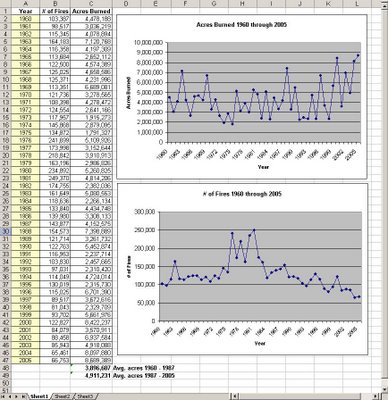- The wildfire season has lengthened 78 days since 1970
- Since 1987, wildfires have consistently burned longer (up to 5-week burning duration) and more intense
- The increase in fire activity and intensity is strongly correlated to early snowmelt, which helps define global warming
I've also mapped a number of fires more than once because they burn so long, which provides ample opportunities to get many satellite overpasses. Indeed, we've had fires burn until the snow flies, much like the fires in Yellowstone in 1988.
I've been tracking the overall number of fires and acres burned annually for a couple of years. The data I got comes from the National Interagency Fire Center (NIFC) and goes back to 1960. While these data show a decrease in the number of fires, the study done by Westerling et. al only focused on large fires, and they reported an increase in large fires. I checked the trends from 1960-1986 vs. 1987-2005 and noted that on average, we're burning over a million more acres a year now than we did pre-1960.
 The Science Express article isn't trying to say this climate change is human induced; rather, they are simply reporting that an increase in fire duration, occurance, and intensity is correlated to indicators (early snowmelt, temp. increase, etc.) defining global warming.
The Science Express article isn't trying to say this climate change is human induced; rather, they are simply reporting that an increase in fire duration, occurance, and intensity is correlated to indicators (early snowmelt, temp. increase, etc.) defining global warming.
2 comments:
Your posting is very interesting. You have a good grasp of the topic. I also heard know of the article you mentioned. It was the subject of a radio program on PBS. Yes, the problem was early snow melt, not the actual higher temperatures during fire season. That was actually one of the things discussed in detail on the radio program.
The reporting of the facts is interesting. I am always cautios about the interpretation of those facts and their compilation into a hypothosis (which is ususally presented in far stronger terms). I do not know about global warming as a man-indused affect. It might be, but there is a lot of evidence otherwise also, especially historically so.
However, the polluting things we do are not good wether they cause global warming or no. I think that all such things should be carefull and steadyly worked on to end or at least minimize.
Dad
PS You are gone so much that I was unable to get you on the phone on your birthday. I did get Jen, yesterday, and she was to wish you a happy birthday for me. Perhaps she gave a kiss and made it an even better day.
One rather important factor left out of this study has to do with land management practices. Most people are aware that for 60 years or so, the United States fought every fire that burned. In fact, for some time we had a 10 am policy, meaning that every new ignition had to be put out by 10 am the next day. This led to 60 years of unhealthy fuel buildup. Perhaps in 1987, the tipping point wasn't a climate change, but a climax of fuel buildup and ignitions.
Post a Comment